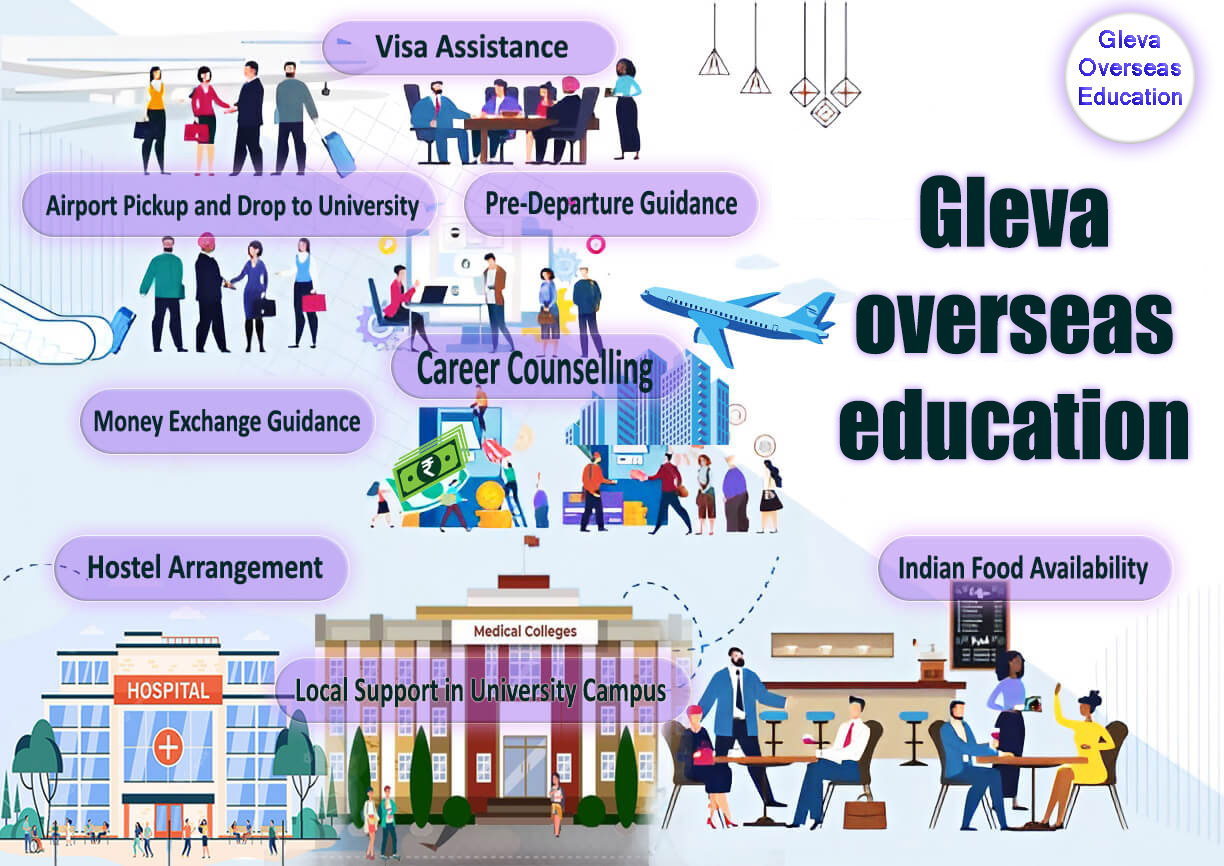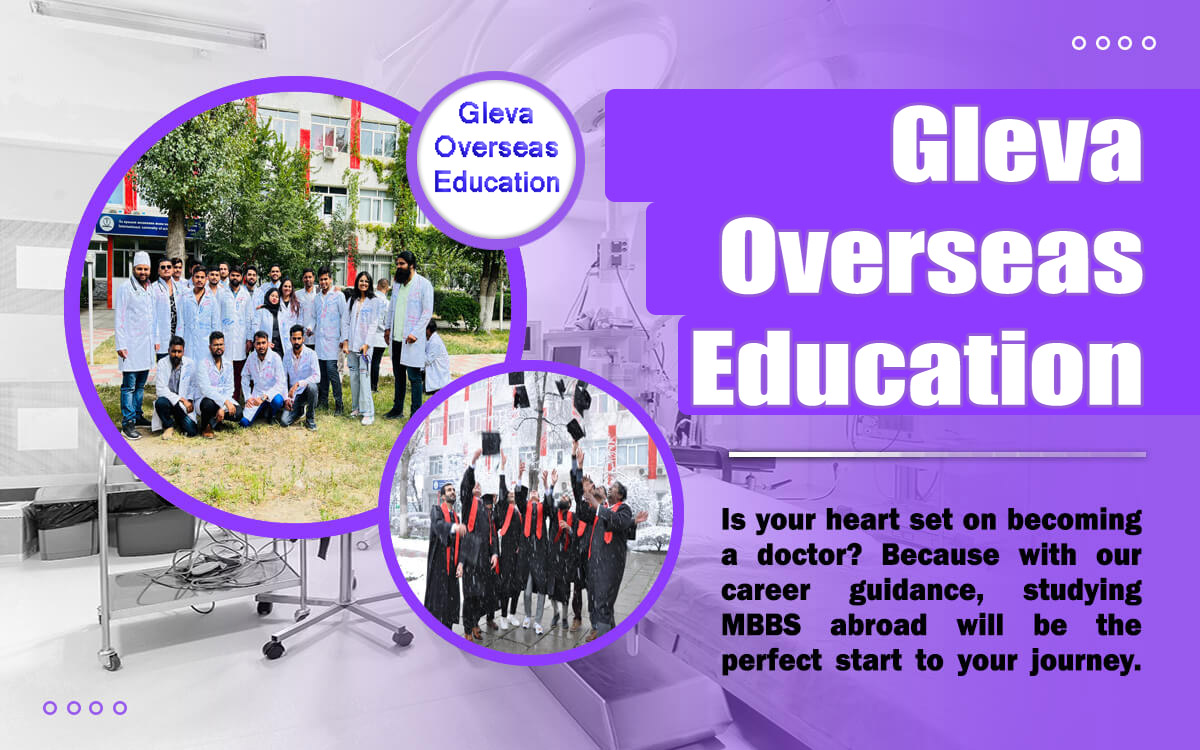
Recognized by NMC (NATIONAL MEDICAL COMMISSION)
Recognized by Ministry of Health of the Russian Federation
WHO approved
North Ossetian State Medical Academy is a prestigious university located in Russia that offers high-quality medical education. It is widely recognized as one of the most famous and sought-after universities in the country. If you're an Indian student interested in pursuing MBBS in Russia, Gleva Overseas Education Pvt. Ltd. (GOEPL) can assist you in gaining admission to North Ossetian State Medical Academy.
Russia is a preferred destination for Indian students who wish to pursue medical studies abroad. There are numerous NMC-accredited medical universities in Russia that offer MBBS programs to Indian students. North Ossetian State Medical Academy is one such university that provides world-class medical education to students from all over the world.
The North Ossetian State Medical Academy (NOSMA) is a prominent medical institution located in Vladikavkaz, North Ossetia-Alania, Russia. Established in 1939 as the North Ossetian Medical Institute, it underwent a name change in 1994 and became known as the North Ossetian State Medical Academy. Over the years, NOSMA has built a strong reputation for delivering high-quality medical education and training.
NOSMA has a rich history of nurturing and producing a large number of skilled healthcare professionals who have gone on to serve both within Russia and internationally. The academy is dedicated to providing comprehensive medical education that equips its graduates with the knowledge and skills necessary to excel in the field of medicine.
The curriculum at NOSMA is designed to meet international standards and incorporates both theoretical knowledge and practical training. The academy offers a wide range of programs, including undergraduate and postgraduate degrees in various medical disciplines. Students have the opportunity to learn from experienced faculty members who are experts in their respective fields.
In addition to its focus on academic excellence, NOSMA places great emphasis on research and innovation. The academy encourages its students and faculty to engage in scientific research, contributing to advancements in medical knowledge and healthcare practices.
NOSMA boasts state-of-the-art facilities, modern laboratories, and well-equipped teaching hospitals, providing students with hands-on experience in a clinical setting. The academy also collaborates with leading medical institutions and universities both within Russia and abroad, fostering international partnerships and exchange programs.
Overall, the North Ossetian State Medical Academy is committed to producing competent and compassionate healthcare professionals who can contribute effectively to the medical field. Through its dedication to excellence in education, research, and clinical practice, NOSMA continues to play a vital role in shaping the future of healthcare in Russia and beyond.
The MBBS (Bachelor of Medicine, Bachelor of Surgery) program at the North Ossetian State Medical Academy (NOSMA) is designed to provide students with a comprehensive medical education. The program prepares students to become qualified medical practitioners capable of diagnosing and treating various medical conditions.
The duration of the MBBS program at NOSMA is typically six years. During these years, students undergo a rigorous curriculum that combines theoretical knowledge with practical training. Here are some key aspects of the MBBS program at NOSMA:
1. Curriculum: The program covers a wide range of subjects including Anatomy, Physiology, Biochemistry, Pathology, Pharmacology, Microbiology, Obstetrics and Gynecology, Pediatrics, Surgery, and more. The curriculum is designed to provide students with a solid foundation in medical sciences.
2. Practical Training: NOSMA emphasizes practical training to ensure that students develop essential clinical skills. This includes clinical rotations in affiliated hospitals, where students gain hands-on experience in diagnosing and treating patients under the guidance of experienced medical professionals.
3. Research Opportunities: NOSMA encourages students to engage in research activities, enabling them to explore and contribute to advancements in medical knowledge. Students have access to research facilities and guidance from faculty members who are actively involved in research projects.
4. Faculty: The MBBS program at NOSMA is taught by a highly qualified and experienced faculty comprising professors, doctors, and specialists in various medical fields. They provide guidance, mentorship, and support to students throughout their academic journey.
5. Facilities: NOSMA offers modern facilities, including well-equipped classrooms, laboratories, libraries, and simulation centers. These resources enhance the learning experience and provide students with opportunities to practice and refine their clinical skills.
6. International Collaboration: NOSMA actively collaborates with international medical institutions, allowing students to participate in exchange programs, internships, and research collaborations. This exposure to a global healthcare perspective enriches their educational experience.
Upon successful completion of the MBBS program at NOSMA, graduates are awarded the degree of Bachelor of Medicine, Bachelor of Surgery. They are then eligible to pursue further specialization or seek employment as medical practitioners in hospitals, clinics, research institutions, or other healthcare settings.
Overall, the MBBS program at the North Ossetian State Medical Academy prepares students for a rewarding career in medicine by providing a strong academic foundation, practical training, research opportunities, and exposure to international medical practices.

The North Ossetian State Medical Academy (NOSMA) employs a well-established teaching methodology that emphasizes a balanced approach between theoretical knowledge and practical skills. The academy's curriculum is thoughtfully designed to ensure that students receive a solid foundation in the basic sciences, such as anatomy, physiology, and biochemistry, before progressing to the clinical sciences.
The teaching faculty at NOSMA is composed of highly qualified professors, doctors, and researchers who possess extensive experience in their respective fields. They bring their expertise to the classroom and utilize a variety of teaching methods to facilitate effective learning. These methods include:
1. Lectures: Professors deliver comprehensive lectures that cover essential theoretical concepts, providing students with a strong theoretical understanding of medical subjects. Lectures serve as an important platform for introducing new topics, explaining complex ideas, and sharing key information.
2. Seminars: Interactive seminars provide an opportunity for students to engage in discussions, ask questions, and exchange ideas. These sessions encourage active participation, critical thinking, and the development of problem-solving skills. Seminars also promote collaborative learning among peers.
3. Practical Classes: Practical classes play a vital role in the medical education at NOSMA. These sessions involve hands-on training, where students learn to apply their theoretical knowledge in practical scenarios. They may participate in laboratory experiments, clinical skills training, and simulation exercises to develop their clinical competencies.
4. Clinical Rotations: NOSMA places significant emphasis on clinical training, allowing students to gain real-world experience in hospital settings. During clinical rotations, students work alongside healthcare professionals, observe patient care, and actively engage in diagnosing and treating patients under supervision. This practical exposure enhances their clinical skills and fosters a holistic understanding of healthcare practices.
5. Research Opportunities: NOSMA encourages students to engage in research activities, providing them with opportunities to contribute to the advancement of medical knowledge. Faculty members guide and mentor students in conducting research projects, fostering critical thinking, and developing analytical skills.
6. Technology Integration: NOSMA incorporates modern educational technologies, such as audiovisual aids, computer-based learning, and simulation tools, to enhance the learning experience. These technologies facilitate interactive and immersive learning, allowing students to visualize complex concepts and practice skills in a virtual environment.
The teaching methodology at NOSMA aims to foster a well-rounded education by integrating theoretical knowledge, practical training, critical thinking, and research skills. It prepares students to become competent and compassionate healthcare professionals who can excel in their careers and contribute meaningfully to the field of medicine.
The North Ossetian State Medical Academy (NOSMA) offers state-of-the-art facilities on its modern campus, providing students with an enhanced learning environment. The academy has spacious classrooms and lecture halls that are designed to accommodate a large number of students. These facilities are equipped with modern technology and audiovisual aids to facilitate effective teaching and learning.
NOSMA takes pride in its well-equipped laboratories that enable students to engage in practical experiments and gain hands-on experience. The laboratories are furnished with the latest equipment and instruments necessary for conducting experiments in various medical disciplines. This allows students to apply their theoretical knowledge and develop essential laboratory skills.
The academy's library is a valuable resource for students, boasting one of the largest medical libraries in the region. It houses a vast collection of books, journals, research papers, and other academic resources. Students have access to a wide range of medical literature, enabling them to conduct in-depth research, stay updated with the latest advancements, and expand their knowledge base.
NOSMA further enhances the learning experience by providing a fully-equipped hospital facility where students can gain practical experience in patient care. The hospital has diverse clinical departments, including internal medicine, surgery, pediatrics, obstetrics and gynecology, and more. Under the guidance of experienced doctors, students have the opportunity to observe and participate in the diagnosis, treatment, and management of patients, further developing their clinical skills and understanding of healthcare practices.
Overall, the facilities at NOSMA are designed to support a comprehensive medical education. The modern campus, well-equipped classrooms, advanced laboratories, extensive library, and functional hospital facility contribute to an enriched learning experience for students, allowing them to acquire the necessary knowledge, skills, and practical experience to excel in their medical careers.
Russian universities have long been a popular choice for medical students due to their affordable fee structures. North Ossetian State Medical Academy is no exception, offering an affordable MBBS program compared to other top medical universities around the world.
The fee structure at North Ossetian State Medical Academy is highly competitive, making it an attractive option for students seeking quality medical education at an affordable cost. The university offers a range of financial assistance and scholarship options to help students finance their education.
Overall, the North Ossetian State Medical Academy Fee Structure is highly affordable and represents an excellent value for students seeking a world-class medical education.
| Fee | Hostel |
|---|---|
| 3,00,000 Ruble/Year | 50,000 Ruble/Year |
| Course Duration 6 years with internship | |

The MBBS program at North Ossetian State Medical Academy in Russia is a 6-year program, with the first five years dedicated to theoretical studies and the final year focused on medical practice and internship. During the second and third years of the program, students have the option to participate in practical research as well.
The curriculum at North Ossetian State Medical Academy is designed to provide students with a comprehensive education in medical sciences. The first five years of the program are focused on building a strong foundation in theoretical knowledge, while the final year provides students with the opportunity to apply their skills in a clinical setting.
Throughout the program, students have the chance to participate in practical research, giving them valuable hands-on experience that can be applied to their future careers in medicine. Overall, the MBBS program at North Ossetian State Medical Academy offers a well-rounded education that prepares students for success in the medical field.
Medical colleges in Russia, including MBBS programs, are known for their high-quality education and rigorous curriculum. The colleges have experienced faculty members and state-of-the-art facilities, including well-equipped laboratories and modern classrooms.
Special facilities for medical students may include access to hospitals and clinical settings where students can gain practical training and hands-on experience. Medical colleges often have dedicated libraries with extensive medical literature and research materials. They may also provide simulation centers or laboratories for students to practice medical procedures and techniques in a controlled environment.
Student life in Russia for MBBS students is vibrant and diverse. Russian universities, including medical colleges, often have a significant number of international students, creating a multicultural environment that fosters cross-cultural exchange and friendship. Indian students can find communities and student associations that cater to their specific needs and cultural backgrounds.
Regarding Indian food, many universities in Russia, including medical colleges, understand the dietary preferences of international students. They often have canteens or dining facilities that offer Indian cuisine or options suitable for Indian students. Additionally, there are Indian grocery stores and restaurants available in major cities, providing familiar ingredients and dishes.
Hostel accommodation in Russian universities, including medical colleges, is typically available for students. The hostels are equipped with basic amenities and provide a comfortable living environment. Special attention is given to ensuring the safety and well-being of students.
Transportation in Russia is well-developed, with efficient public transportation systems such as buses, trams, and metros available in most cities. Students can easily navigate around the city and commute to their medical colleges using public transportation.
Overall, student life in Russia for MBBS students offers a supportive and enriching experience, with facilities and services designed to meet their academic, cultural, and personal needs.


Stay ahead of the curve on your MBBS admission abroad! Sign up for our expert medical consultancy updates and receive the latest news and advice on top international universities, application procedures, scholarships, and more. Don't miss your chance to make become a Doctor a reality.